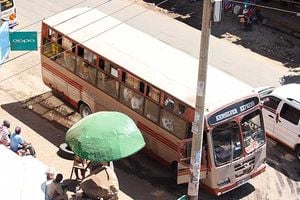Court dismisses Kisumu taxi, boda boda operators' eviction petition

Boda boda riders wait for customers in Kisumu's CBD.
Taxi, tuk tuk and boda boda operators in Kisumu have been dealt a blow after a High Court dismissed their petition that sought to declare their eviction from the Central Business District as an infringement of human rights.
The petitioners had moved to court in February following a notice by the Kisumu City management that ordered them to park their vehicles outside the CBD to pave way for city expansion.
On Friday, Justice Fred Ochieng’ of Kisumu High Court ruled that the evidence presented by the complainants before the court did not support the assertions.
“The petition is without merit and is therefore dismissed,” ruled Justice Ochieng’.
He stated that the respondents had presented evidence in court showing that they had organised several discussions with the petitioners between 2016 and 2018 before carrying out the evictions.
According to the judge, the petitioners who had attended the meetings should have put forward their proposals for consideration during the public participation.
Involuntary evictions
"The court cannot now be called upon to determine how the stakeholders could have resolved the issue of involuntary evictions of persons from the CBD,” continued the judge.
The petition filed by six members on behalf of the complainants, argued that they were never consulted by the city authorities before the decision was made.
They told the court that the eviction notice dated February 19 had outlawed further sale of goods on the new transport lanes within the CBD.
According to the petitioners, those affected by the eviction notice ought to have been engaged in crafting resettlement policy framework which would have given the procedures for involuntary resettlement
They argued that they had been subjected to inhuman treatment contrary to section 25 of the Constitution.
“The petitioners’ right to life had been infringed as per article 26 of the Constitution after their source of livelihood was destroyed, leaving them in a life-threatening condition,” read the court documents.
The complainants also accused the respondents of infringement to their right to dignity under Article 28 of the Constitution.
They further argued that their right to own property had been infringed by the forceful evictions which left their property destroyed.
The petitioners went ahead to compel the respondents to engage them in crafting a relocation action plan before the implementation of the eviction notice.
Compensation
They further sought orders to have all the affected persons including 500 boda boda riders and 200 tuk tuk compensated.
In defense, the respondents told the courts that they had issued appropriate notices to the complainants prior to the evictions.
They also told the courts that they had involved the respondents in discussions and consultations during which a number of resolutions were developed in favor of both parties.
According to Justice Ochieng’, the claims for compensation put forward by the petitioners were varied because they had initially stated that only 73 riders were affected but had raised the number to 500 when seeking compensation.
“In effect to compensation, sought for a much larger group than the petition specified, no explanation was tendered for the expanded numbers,” said Justice Ochieng'.
The court cannot permit a case to be enlarged at the stage of submissions to bring on board persons who were not originally parties of the case,” ruled the judge.
“The court has to be provided with a very clear picture of the exact circumstances prevailing in the said specific cases, if the court.





